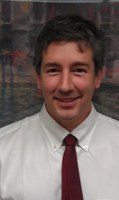Archived Faculty Profiles
Mark Austin is a professor of sociology and also serves on the program faculty of the Urban and Public Affairs PhD program. A good deal of his past and current research has focused on issues related to community and urban sociology examining matters such as perceptions of safety, attitudes about growth and the environment, reactions to crime, and factors related to neighborhood satisfaction. While much of his past research has focused on geographically stable communities, in more recent work he has examined issues related to geographically mobile communities with some of his research dealing with community, historical, and subcultural issues involving motorcyclists in American culture. This has also lead to an interest in edgework, the sociology of risk-taking. Additionally, some of his work has combined the use of photography and survey research.
He has received the College of Arts and Sciences Distinguished Faculty Award for Teaching and the President’s Distinguished Award for Teaching.
He is an avid touring motorcyclists, as one might guess from some of his academic work. Additionally, he spends time caring for rescue and foster dogs.
 Meet Dr. Bob Carini
Meet Dr. Bob Carini
Dr. Bob Carini, associate professor of sociology, regularly teaches SOC 301 Social Statistics, SOC 425 Sociology of Leisure, SOC 611 Statistics III (multivariate statistics), and SOC 622 Survey Research and Design. Recently, we talked with Dr, Carini to learn more about his academic background, what drew him to sociology -- and eventually sociology of leisure, and his advice to students.
Tell us a bit about your academic background?
I earned a BS in civil engineering at Virginia Tech, an MA in sociology at South Carolina, and a PhD in sociology at Indiana University. My undergraduate training in engineering enhanced my problem-solving skills, provided a framework for viewing the world, improved my technical writing, and fostered an appreciation for interdisciplinary approaches. Ultimately, though, I was drawn to sociology and had several key mentors who provided a variety of perspectives on what the discipline was and what it could offer.
So what exactly drew you then to sociology for graduate school?
A course titled “Dating, Marriage, and Divorce” – taken on a whim as an elective during my senior year. It really opened my eyes to how so many social issues could be informed by sociological perspectives.
Your thesis and dissertation were both focused on education. What encouraged the move to leisure in recent years?
“Classical” sociological theorists contributed key understandings on leisure, but then sociology largely abandoned the topic to other disciplines. But when sociologists here and there have studied leisure, their work has been very influential. It’s a topic and even a field of study that is so devalued in societies that glorify paid work, yet leisure is incredibly important with respect to individuals’ well-being, socialization, and identity(ies), not to mention its importance for families, organizations, communities, economies, and even countries.
You also teach both undergraduate and graduate statistics and methods courses. You often talk about these courses providing students with a “toolkit” to understand their social world. Explain that.
Scientific inquiry is but one way of learning/knowing about our world, but it has proven to be an important means of inquiry! Courses on research methods and ways to analyze data are building blocks to understanding and conducting research on social life. Once you have these basic tools, the sky is the limit in terms of the sociological topics that can be studied.
Several of your publications have resulted from working with graduate students. Tell us why you enjoy working with them and the benefits of publishing as a graduate student.
Graduate students are often passionate about their thesis or dissertation topic. I enjoy working with them – whether as a chair or committee member – to help them produce their best work. After their coursework is completed, they are sometimes surprised by how much they learn about research only when they carry out a study from start to finish. It’s gratifying to see both their progress along the way and excitement about a study in print.
Finally what advice would you give a student considering a graduate degree in sociology?
I encourage students to master as many skills as possible during graduate school. It’s a wonderful opportunity to read deeply and immerse oneself in the discipline as a science. Developing a toolkit of research methods and analytic skills won’t go out of style, as some topics de jour might – and are, of course, highly valued in the workplace. For instance, I encourage students to cultivate skills with respect to both qualitative and quantitative data collection and analyses, as well as to “tell the story” of their findings, e.g., with data visualization strategies. These research skills are general enough to be applied to virtually any topic they might choose.
Dr. Roberto Fernández Morales is an assistant professor and teaches SOC 201, 320, and 323. Dr. Morales recently graduated with his PhD in sociology from the Ohio State University with a dissertation focused on the influence social media has on the development of young adults’ political identity and political engagement, particularly as it relates to understanding the creation of liberal versus conservative identities.
Dr. Roelfs is an associate professor of sociology whose research interests include macro-level organizational analysis (the study of changes in industries over time) and meta-analyses of the social determinants of mortality. Recently completed projects include a study of the effect of climate and other geographic factors on transnational immigrant mortality (with Eran Shor) and a study of museum characteristics that are associated with art vandalism and theft (with Katherine Salomon, Ryan Schroeder, Peter Morrin, and John Begley). In addition to ongoing research on shopping malls (with Jamar Wheeler) and on the correlates of mortality among transnational immigrants (with Eran Shor), Dr. Roelfs is currently engaged in a study of the US mega-church population (with Rob Shelby), institutional influences on neighborhood revitalization projects (with Joe Bohn), and macro-level predictors influencing physicians’ practice location decisions (with Timothy Lau).
